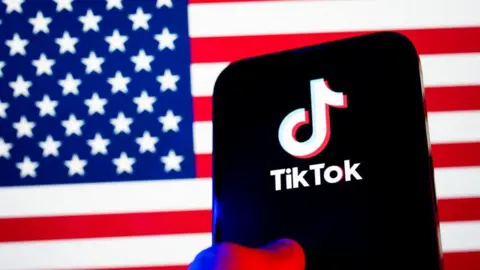The US Supreme Court upholds the law banning the app

 Getty Images
Getty ImagesThe US Supreme Court has upheld a law banning TikTok from the US unless China-based parent company ByteDance sells the platform this Sunday.
TikTok challenged the law, saying it would violate free speech protections for the more than 170 million users it says it has in the US.
But that argument was unanimously rejected by the country’s highest court, meaning that TikTok must now find an authorized buyer for the US version of the app or face removal from app stores and web hosting services.
The White House said it will fall to the administration of incoming President Donald Trump, which takes office on Monday, to maintain the law. Trump vowed to make a decision “in the not too distant future”.
TikTok is contacted for comment.
Both Democrat and Republican lawmakers voted to block the video-sharing app last year, over concerns about its links to the Chinese government. TikTok has repeatedly said it does not share data with Beijing.
The law gives TikTok’s owner, ByteDance, until January 19 to sell the US version of the platform to a neutral party to avoid an outright ban.
It could mean that from Sunday, Apple and Google will no longer be able to offer the app to new users or provide any security updates to current users – which could be fatal in the end.
ByteDance has vowed not to sell TikTok and plans to shut down US operations of the app on Sunday unless there is relief.
The Supreme Court ruled with no dissenting opinions that the law did not violate the First Amendment to the United States Constitution in preventing government abridgment of freedom of speech.
The judges upheld a lower court ruling in favor of the move after a challenge by ByteDance.
“There is no doubt that, for more than 170 million Americans, TikTok provides a unique and expansive space for expression, a means of communication and a source of community,” the Supreme Court said.
“But Congress determined that the divestiture was necessary to address its well-founded national security concerns about TikTok’s data collection practices and relations with a foreign adversary.”
‘Stay tuned!’
After the Supreme Court’s decision, White House press secretary Karine Jean-Pierre said in a statement that President Joe Biden’s position on TikTok has been clear for months: “TikTok should always be available to the American people, but under American ownership or other ownership that speaks to the national security concerns identified by Congress in developing this law .”
But because of the “absolute truth of the moment”, he added, the president “actions to implement the law should fall to the next administration, which will start working on Monday”.
On Friday, Trump wrote on his social network Truth Social: “The decision of the Supreme Court was expected, and everyone must respect it.”
“My decision on TikTok will be made in the near future, but I should have time to review the situation. Stay tuned!”
He also revealed that he spoke with Chinese President Xi Jinping and discussed TikTok among other issues.
In December Trump said he had a “warm spot” for the app as it helped him with younger voters in the 2024 election. TikTok CEO Shou Zi Chew will also attend Trump’s inauguration, sitting among other high-profile guests.
Trump’s comments mark a shift in his stance during his first term as president when he intends to make the same prohibition through executive order.
Ruling bans China from ‘weaponizing TikTok’
Cybersecurity firms have suggested that the app is able to collect user data beyond what they watch on TikTok.
Attorney General Merrick Garland said sovereign states should not have “unfettered access” to US data and that the ruling prevented China from “arming TikTok to undermine US national security”.
China passed a law in 2017 forcing Chinese citizens living abroad to cooperate with its intelligence services.
But Beijing has denied that it pressures companies to collect data on its behalf and criticized the ban. TikTok has repeatedly insisted that it has not been asked for its data.
The app argued that the law threatens First Amendment rights and would affect its users, advertisers, content creators and employees. TikTok has 7,000 US employees.
Noel Francisco, a lawyer for TikTok and ByteDance, told the Supreme Court during the arguments that the app is “one of the most popular speech platforms in America”, and said that the law would require it to be “dark” unless ByteDance sells the app.
The ban comes at a time of heightened concern in the US about Chinese espionage.
Source link



